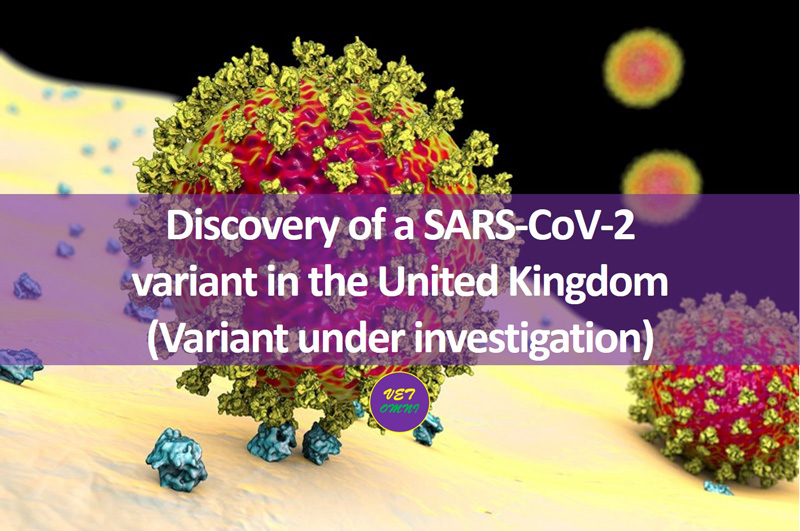
Health & Administrative authorities of the United Kingdom and Northern Ireland reported a SARS-CoV-2 variant to the World Health Organization (WHO) on 14 December 2020. This type of variant was recognized through viral genomic sequencing and generally referred to as SARS-CoV-2 VUI (Variant under Investigation). In this usual term SARS-CoV-2, “SARS” stands for severe acute respiratory syndrome and CoV-2 means coronavirus 2. Initial reports received from the United Kingdom are that this variant is more rapidly transmissible than COVID-19 with a recorded increase of between 40% & 70%. Several countries including Belgium, Netherland, Pakistan, China have issued travel bans from the United Kingdom for different periods. SARS-CoV-2 variant contains multiple spike protein mutations (deletion 69-70, deletion 141, A570D, P681H, D1118H, N501Y, D614G, T7161), and some mutations have been observed on receptor binding sites also.
Epidemiology
If we talk about the epidemiology of the SARS-CoV-2 Variant then we can say that several investigations about this variant are ongoing but still, we are facing many issues, higher mortality rate, poor clinical results, and affected people index rising day by day. Preliminary identification shows that this variant is identified in different age people between 40-60 years old and the UK-based SARS-CoV-2 strain is directly associated with COVID-19. SARS-CoV-2 variant was used as a part of an epidemiological & virological investigation since its emergence.


Mutations in SARS-CoV-2 Variant
SARS-CoV-2 is constantly evolving, receiving one new mutation in its genome every two weeks. Many mutations are silent (e.g., they do not cause changes in the protein structures they incorporate) because they produce a three-letter codon that translates to the same amino acid (i.e., synonymous). Some mutations can alter the codon in a way that leads to amino acid changes (i.e., nonsynonymous), but this amino acid supplementation does not affect the function of the protein.
SARS-CoV 202012/01 has 3 deletions, 14 amino acid altering mutations that are called non-synonymous mutations, and 6 mutations that do not alter the AA called synonymous mutations
• P681H: This mutation has also raised many times spontaneously near the S1/S2 site
• 69/70 deletion: This is a double deletion that causes the alteration in the shape of spike proteins
• ORF8 Stop Codon: This mutation is somewhat different and doesn’t cause any change in spike protein but causes changes in different genes
Will the Vaccine still work for SARS-CoV-2 VUI?
The new variation is a change in the spike protein identified by the three leading targets. However, vaccines produce antibodies against multiple regions in the spike protein, so it is unlikely that a single mutation would make the vaccine ineffective. Over time, as many changes occur, the vaccine may need to be modified. This happens with the flu, which changes annually, and the vaccine is appropriately prepared for this annual flu. The SARS-CoV-2 virus does not change as quickly as the flu virus, and vaccines to date are effective in trials by strains that can be easily removed if needed.
Sharon Peacock, the Director of COG-UK said, “With these exceptions, there is no evidence that it will prevent vaccination or the human body’s response. But in the event of a vaccine failure or infection and that case should be considered the most important factor in genetic sequence. All signs, symptoms, and pieces of evidence are under keen observation about this variant since its emergence.”
Is this Variant more dangerous?
The answer to this crucial question is under processing and investigation. Public Health England’s laboratories have been working to find out any evidence about this new variant severity. Many variants have been detected from different regions of the United Kingdom and the “D614G” variant is one of them & the most common circulatory variants that can transmit the virus more quickly. As of now, we can say that there is no evidence about the severity & seriousness of this SARS-CoV-2 VUI.
Precautions for Community

It is the sole responsibility of communities and health workers to adopt basic principles to reduce the general risk of transmitting serious respiratory infections:
- Avoid any type of close contact with people suffering from respiratory infections & fever
- Wash hands regularly and properly, especially after direct contact with sick people or their environment
- People with symptoms of respiratory infection should cough with care, for example, maintain distance, close the cough and sneeze with disposable tissue or clothing, and wash their hands
- In health care facilities, there should be an increase in infection control measures in hospitals, especially in emergency departments
- Wear masks and cover nose and mouth where appropriate and ensure proper ventilation
Conclusion
As we know SARS-CoV-2 VUI is an emerging variant from the United Kingdom with rapid transmission than COVID-19. However, there are many questions about vaccine working, future health & legislative strategies but we can only say that research and analysis are still ongoing for this variant. According to the latest conclusion, the “Reproduction or R number” of this variant increase by between 0.4 & 0.7. And now the United Kingdom “R number” has been reached between 1.1 and 1.3 which needs to fall.
References
- https://www.independent.co.uk/news/health/coronavirus-new-variant-matt-hancock-cog-uk-latest-b1774502.html
- https://www.cdc.gov/coronavirus/2019-ncov/more/scientific-brief-emerging-variant.html
- https://www.who.int/csr/don/21-december-2020-sars-cov2-variant-united-kingdom/en/
- https://www.bbc.com/news/uk-51768274
Author: Usama Mujahid, Bahauddin Zakariya University, Multan-Pakistan
Leave a Reply